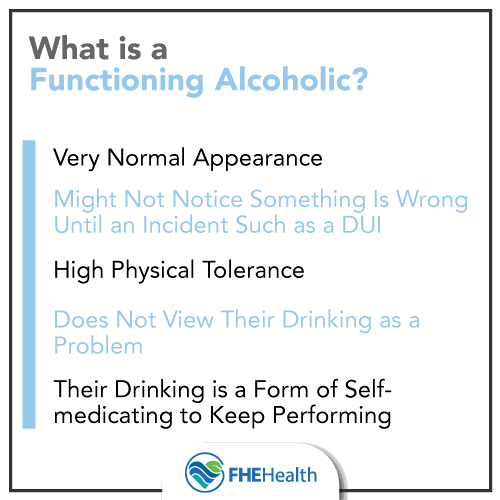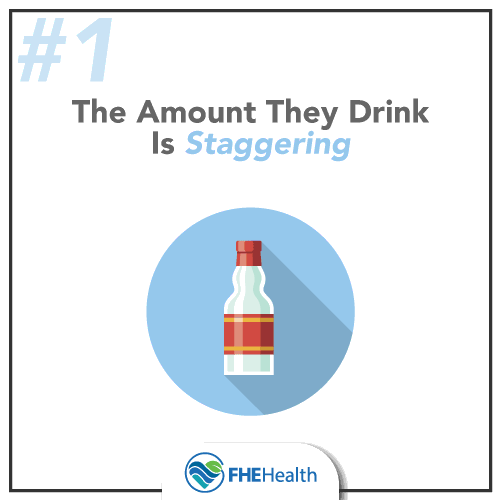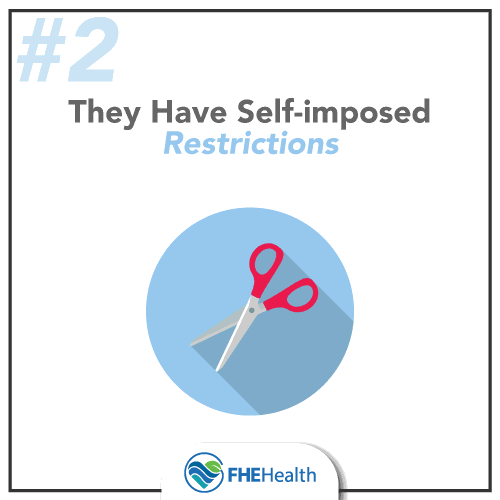
Do you have a functioning alcoholic in your life? It’s typical to believe an alcoholic is a person who stumbles around, barely gets through the day and can’t hold down a steady job. However, a high-functioning alcoholic can do all of this and much more. If you believe your loved one is relying on alcohol for any need, it may be time to take a closer look at whether or not they fall into the category of a functioning alcoholic.
The Picture of a Functioning Alcoholic
 A person who has a secret alcohol disorder is an individual who appears to be very normal. They look and act sober. They may be an attorney or work in a school. In nearly all cases, you won’t know this individual has an alcohol abuse and alcoholism problem until a significant event happens, such as a DUI, that makes them come face-to-face with their illness.
A person who has a secret alcohol disorder is an individual who appears to be very normal. They look and act sober. They may be an attorney or work in a school. In nearly all cases, you won’t know this individual has an alcohol abuse and alcoholism problem until a significant event happens, such as a DUI, that makes them come face-to-face with their illness.
To be a functioning alcoholic, a person has to generally be in denial of their heavy drinking and have developed a physical tolerance to it. A person who has a drink with friends after work each day is developing a higher tolerance for the substance, possibly leading to drinking problems like drinking more often or more heavily. When dependency occurs, it’s no longer about socializing but about getting a necessary fix just to function normally. Yet, with that higher tolerance level, many men and women like this don’t recognize their condition as a true addiction.
Signs of a Functioning Alcoholic
How do you know if the person you live with, work with or socialize with is a true closet drinker? A high-functioning alcoholic often shows red flags such as the following:
 #1: The Amount They Drink Is Staggering
#1: The Amount They Drink Is Staggering
One key way to link a functioning alcoholic to their addiction is by looking at the quantity of consumption. Men who consume 10 or more drinks per week and women who consume at least 7 alcoholic drinks per week are considered alcoholics, according to the U.S. National Library of Medicine. What makes a functioning alcoholic different is their ability to not just drink but to still maintain what seems like sobriety. It doesn’t impact their ability to be responsible.
 #2: They Have Self-Imposed Restrictions
#2: They Have Self-Imposed Restrictions
Functioning alcoholics can control when they drink. This helps them control their behaviors and maintain their jobs. For example, some may say, “I never drink at home, just at the bar.” Some may limit what they drink, who they drink with or when they drink as well. These restrictions help the person struggling with the alcoholism to believe they’re able to control their drinking. By comparison, a non-functioning alcoholic just seeks out alcohol without as much regard to such limitations.
 #3: They Live Double Lives
#3: They Live Double Lives
Many high-functioning alcoholics recognize their need for alcohol, but they keep the various areas of their lives separate. For example, they drink only after work, never during work-related functions or in the office. They go home and drink a bottle of alcohol a night, though. Some also take great steps to create a portrait of a healthy person. They may go to the gym, hang out with friends and even go to their children’s soccer games.
What makes a functioning alcoholic different is that they believe their ability to maintain a normal life keeps them from being an alcoholic. They believe they are in control. They may be fantastic parents, great students or promising employees, but they still need alcohol to get through their daily routine. A typical alcoholic is less able to keep their problem with alcohol separate and hidden.
 #4: They Hide the Signs of a True Problem
#4: They Hide the Signs of a True Problem
Another way functioning alcoholics stand out from the rest is their ability to hide their larger, more high-risk problems. For example, you may not be able to contact a loved one for a period of time. Later, you’re told they were “just with friends,” but they may have been binge drinking. Some suffer blackouts and miss blocks of time during their day as a result. Some may also hide tickets for DUIs or cover up their poor performance at work.
Unlike a traditional alcoholic, the functioning alcoholic is better at hiding mistakes. Yet the action of hiding those mistakes is a sure sign that they’re an alcoholic.
 #5: The Bargaining
#5: The Bargaining
While a friend or family member may not have any insight into this, many high-functioning alcoholics spend a lot of their time bargaining with themselves — deciding they’ll only have a couple of glasses of wine, for example. If they can hold themselves to that limit, they rationalize away any alcohol addiction. Reassuring themselves, not just family, is a sign of an addiction.
These individuals are more likely to care about outward appearances than traditional alcoholics. They believe that if they can successfully hide it, they don’t have a problem. These types of behaviors also often accompany something all alcoholics struggle with: obsessive thinking about drinking.
#6: The Explanations
When confronted about their drinking issues, some alcoholics are capable of providing seemingly reasonable and rational explanations for why they drink so much or so often. Often, this will involve issues that everyone deals with in their own way, so it’s not a big leap of logic to believe that someone might have a few drinks to take the edge off. Some common explanations for drinking might include too much stress at work, dealing with unruly kids, or even something like alcohol helping them fall asleep after a long day.
In certain circumstances, they might even reason that alcohol actually helps them perform better than being sober. Some alcoholics truly believe this, as being intoxicated helps them feel more confident in their abilities, while others are intentionally using it as a cover for the amount they drink.
Ultimately, the explanations are just a method of avoiding the fact that they have an issue with alcohol, and though the reasons are potentially rational, excessive drinking is not a healthy way of managing those problems.
#7: Drawing Comparisons to Others
Another way that many alcoholics may deflect from their relationship with drinking is by drawing comparisons to behaviors in others that they deem “worse” than their addiction. Sometimes, this might be pointing to people they know who drink more or have more severe consequences after drinking. In other circumstances, they might explain away their addiction by stating that it’s not as bad as drug addiction or some other substance use issue. They might even rationalize their issues as only affecting themselves whereas murderers or other criminals hurt or kill others.
#8: Getting Upset at Sober Events
A growing number of events and venues will not provide alcohol or even outright block alcoholic beverages. The reasons for this vary, of course, and will not bother most people beyond a bit of annoyance. However, becoming irrationally upset at an event that traditionally serves alcohol—a wedding, New Year’s party, or sporting event—is one of the recognizable behaviors of an alcoholic. In some cases, they will make passive-aggressive comments about the lack of alcohol or joke about how much more fun the experience would be with alcohol. In the worst cases, they might even become aggressive, confronting people about the lack of drinks.
#9. They Have “Stopped Drinking” Several Times
There should be zero doubt that living a sober lifestyle can be extremely difficult. Many people start the road to recovery but stumble back to the substance of their choice—sometimes multiple times. This is not a reason to shame anyone or guilt them.
Some high-functioning alcoholics do recognize that they have a problem with drinking. They take steps toward sobriety or even remain sober for a notable amount of time. However, addiction is a constant urge, so they sometimes relapse and return to old habits. This can become a cycle of quitting alcohol, relapsing, and then abstaining again. Despite the desire to quit drinking, many people will refuse treatment or help. Often, there is a mindset that it is a personal problem that they need to “solve” themselves, despite it being notoriously difficult to achieve.
Why It May Be Harder to Get Help for a Functioning Alcoholic
Perhaps the most difficult component of managing a high-functioning alcoholic is their belief that there isn’t a problem. They’re doing fine at work, school and home, so they believe they’re controlling their drinking. Some may even believe a couple of drinks a day is necessary to manage stress.
Often, a functioning alcoholic will stay away from family and friends. Over time, this worsens, leading to less ability to meet relationship requirements. Many times, alcoholism like this becomes a coping mechanism, helping to reduce high stress and becoming a crutch. They need it. As a result, many will fight very hard with you about getting help or recognizing a problem even exists.
The Myth of a Functioning Alcoholic
It’s also important to see what an alcoholic is. A person who drinks excessively, whether or not they monitor it, is doing damage to their physical body. This limits their lifespan and impacts the quality of their lives. It’s a myth to believe that because they seem to be able to “control” their drinking, it’s not doing harm to them.
Second, many people with this form of alcoholism are actually using it to help them with mental illness. Data from the National Comorbidity Survey found that as much as 25 percent of functioning alcoholics also suffer from depression. When you consider that mental illness can’t be treated alone and won’t just go away, it’s clear to see that your loved one needs help.
Over time, all alcoholism becomes impossible to sustain. Most will find that their body cannot handle enough of the toxins from alcohol to keep giving them the numbing feeling it provides. Over time, alcohol is no longer enough to support their stress levels, either. This impacts their health, mental well-being and relationships. Eventually, all functioning alcoholics break and, in some cases, it’s too late to get help.
Do You Have a High-Functioning Alcoholic?
If you believe your loved one is suffering as a functioning alcoholic or closet drinker, take action to get them help. Whether through our traditional treatment programs such as detox and inpatient care or with an intervention, you can get your loved one the support they need at FHE Health. Contact our compassionate team of counselors to discuss your loved one’s needs by calling for immediate help 24/7.






